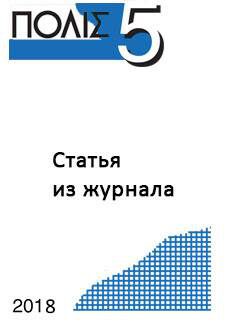Online shop of "Polis. Political Studies" Journal
We in the world, the world in us
Smorgunov L.V. Blockchain as Institution of Procedural Justice. – Polis. Political Studies. 2018. No 5. P. 88-99 (In Russ.)
Free!
blockchain; procedural fairness; reputation; autonomous identity; trust; reciprocity; collaboration; “Active citizen”.
In the theory of public policy, it is essential to find a fair procedure that could be used to obtain an equitable result in the course of choosing and making public decisions. Blockchain, as a network of distributed registers, is often positioned as a political institution that ensures the fairness of decisions by voting on the basis of a pure procedure. Political theory distinguishes between pure, perfect and imperfect procedural justice. The last two types of procedural justice are based on the criterion of a fair result, which is achieved on the basis of a perfect and imperfect procedure. Pure procedural justice is indifferent to a certain resulting criterion; it can be used to solve any issues. This article analyzes the political ontology of the pure procedural justice of blockchain technology, which relies not on the legal nature of the constitution of interaction in the network, but on the technical and social immediacy of cooperation and joint production. These qualities of pure procedural justice in the blockchain, as shown in the article, are provided by the relevant protocols and create the conditions for maintaining a reputation, forming an autonomous identity and building a special trust regime. An equally fair consensus procedure based on reciprocity and autonomy is also important. The article proves that such an institutional configuration of the blockchain acts as an analog of the political concept of J. Rawls’s justice as honesty. The empirical basis of the study is the analysis of cases of using blockchain-voting on the platform “Active citizen” (Moscow).
 English
English Русский
Русский

Reviews
There are no reviews yet.